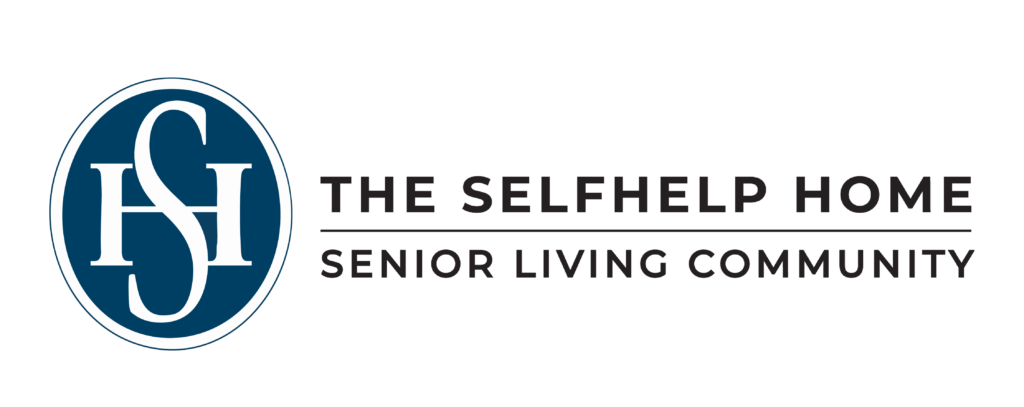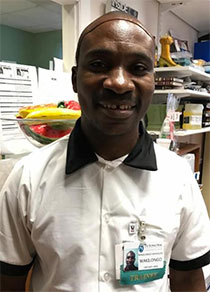Contributed by Beth Gomberg-Hirsch
The mission of The Selfhelp Home dates back to the 1930’s where a community within a community helped those fleeing Nazi Germany find a safe place to live and flourish in a new country, with a new language, supported by people who understood their past. As refugees, they established the Selfhelp Home to provide care and compassion for their fellow Holocaust survivors. While that original population is now dwindling, the core commitment to helping the stranger continues. Through the guidance and mentoring of Sophie Metovic, the dietary manager, the Selfhelp Home has partnered with RefugeeOne, an independent non-for-profit organization founded in 1982 that provides assistance to refugees resettled in the Chicago area. In needing to become an independent, self-supporting member of a new community as quickly as possible, employment is key, so in July 2016, the partnership between the Selfhelp Home and RefugeeOne began.
Ms. Metovic currently employs four people referenced to her from RefugeeOne. These individuals are so grateful for employment, that they see the dignity in jobs that others might not, and are hard workers trying to do their best, even with severe language barriers. Ms. Metovic tries to match their skills with the tasks she has available ranging from dishwashing, waiting on tables, baking and other miscellaneous jobs. Language is a continual challenge, but non-verbal body language speaks volumes. Some of the languages spoken are French, Portuguese, Swahili, Kinyindu, Kituba, Kikongo, Lingala and Tigrjnya.
Here are some of the brief biographies of the people:
 Adim Tekia, from Eritrea and Ethiopia, has a husband in Israel who is an engineer. She has a ten-year-old son who comes to the Selfhelp Home everyday after school and quietly sits in a corner and does his homework while his mother works. She helps in the kitchen and wants to get her paperwork in order so that someday she can be reunited with her husband. She is working to pay her rent and feels lucky to have a job where she can begin to learn English and feel supported and safe. She has been here for 10 months.
Adim Tekia, from Eritrea and Ethiopia, has a husband in Israel who is an engineer. She has a ten-year-old son who comes to the Selfhelp Home everyday after school and quietly sits in a corner and does his homework while his mother works. She helps in the kitchen and wants to get her paperwork in order so that someday she can be reunited with her husband. She is working to pay her rent and feels lucky to have a job where she can begin to learn English and feel supported and safe. She has been here for 10 months.
 Tishibola Kalala is here from the Congo with her husband and two children. She is now pregnant with her third child and works as a waitress in the dining room. This is her first job, and in her limited English, with a big smile, she says, “everyone here is very nice.” She has been in Chicago for seven months.
Tishibola Kalala is here from the Congo with her husband and two children. She is now pregnant with her third child and works as a waitress in the dining room. This is her first job, and in her limited English, with a big smile, she says, “everyone here is very nice.” She has been in Chicago for seven months.
 Wakilongo Kahugusi from the Congo was a nurse in his country, and would someday like to be licensed here as he learns more English. He has three children- a daughter who is 14, and two sons, 13 and five. Wakilongo has been here six months and takes his job very seriously. He dresses very professionally, and is very hard working, always trying to please. He serves coffee to residents and does dishwashing.
Wakilongo Kahugusi from the Congo was a nurse in his country, and would someday like to be licensed here as he learns more English. He has three children- a daughter who is 14, and two sons, 13 and five. Wakilongo has been here six months and takes his job very seriously. He dresses very professionally, and is very hard working, always trying to please. He serves coffee to residents and does dishwashing.
 Lalia Mweniake is here from Africa and lived in the Congo. She has worked at Selfhelp for 1 year. She has a husband that lives in the Congo and a 6 month old baby named Peter. Lalia lives with her sister Mapenzi, who also worked at the Selfhelp home and recently had a baby. The sisters give each other support. Lalia works in our Dietary department as a waitress in the dining room. In the Congo she studied Social Work and says the best part about her job is that she gets to help people and enjoys being a part of Selfhelp.
Lalia Mweniake is here from Africa and lived in the Congo. She has worked at Selfhelp for 1 year. She has a husband that lives in the Congo and a 6 month old baby named Peter. Lalia lives with her sister Mapenzi, who also worked at the Selfhelp home and recently had a baby. The sisters give each other support. Lalia works in our Dietary department as a waitress in the dining room. In the Congo she studied Social Work and says the best part about her job is that she gets to help people and enjoys being a part of Selfhelp.
Ms. Metovic reports that as immigrants, like the people that inhabited the Selfhelp Home originally, there is gratefulness in being here, and a connection is made with the residents as if a special bond exists. There is a cultural connection of being the “other” and finding yourself in a secure space. Selfhelp has become a safe haven providing a mixture of love and caring while trying to teach the American way. Wakilongo described working in the kitchen to working in a hospital. , Ms. Metovic blanched, thinking he was referring to Selfhelp as being cold and institutional. “No, No, ” he said.” It is because it is so clean, and we have to wash our hands so many times in the kitchen.”
It is the goal of this partnership to help new refugees integrate into this country-to to become what they ultimately want to be. It is a challenge to recognize the dignity of all work as a step to citizenship. These four individuals realize they are lucky to have been given opportunity, and want to provide the residents of Selfhelp the care and assistance they deserve. It supports the initial mission of the Home to be able to go back to the Home’s roots, and support the stranger among us.
You can learn more about RefugeeOne and our partnership in the featured video.


